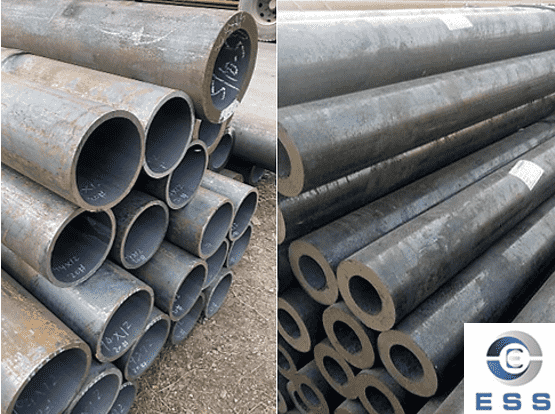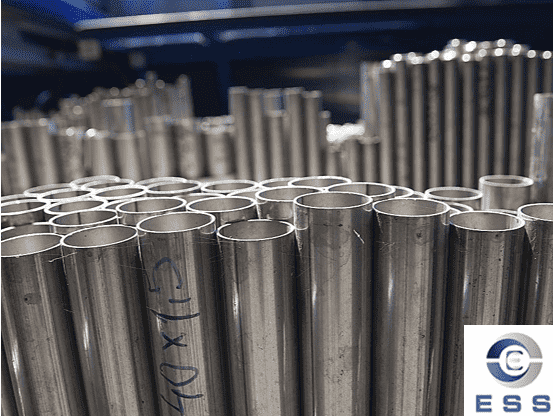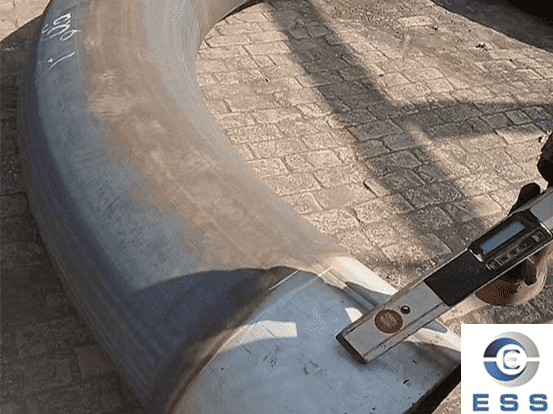Stainless steel seamless pipes are a type of pipe with strong corrosion resistance, and they still have excellent durability under harsh environments such as high temperature and corrosion. Stainless steel pipes have a fine texture and high surface finish, which can avoid the accumulation of dirt in the pipes and does not affect normal use. At present, stainless steel pipes are widely used in chemical and pure water system pipes of boilers.
Carbon steel pipes are a type of material with high strength, durability and wear resistance, usually seamless steel pipes. Carbon steel pipes are one of the most commonly used pipes in boiler systems and can be used to transport high-temperature and high-pressure steam, oil, gas and other media. However, due to the certain corrosiveness of carbon steel pipes, they need to be cleaned and maintained regularly.
3. Alloy steel pipes
Alloy steel pipes are a type of pipe with excellent durability under high strength, high temperature and high pressure. Alloy steel pipes are more corrosion-resistant than carbon steel pipes and have good processing and welding properties. Alloy steel pipes are expensive, but they usually have a longer service life.
How to choose high-quality boiler tube materials
When choosing boiler tube materials, the following factors need to be considered:
1. Corrosion resistance
There may be corrosive gases or liquids in the working environment of the boiler. Depending on the boiler use environment and the medium to be transported, it is very important to choose pipes with good corrosion resistance. If you encounter an acidic environment, stainless steel or nickel-based alloys are common choices. Stainless steel pipes are used in chemical treatment areas and environments with high corrosion resistance requirements, while carbon steel pipes or alloy steel pipes are suitable for pipelines that generally transport media.
2. High temperature resistance
The temperature of the boiler is different under different working conditions. The boiler is a high-temperature equipment, and the bearing capacity of the pipeline needs to be considered when selecting the material of the pipeline. Generally speaking, at high temperatures, commonly used materials include ferritic stainless steel, alloy steel, and superalloys. At low temperatures, ordinary carbon steel can meet the needs.
3. Pressure resistance
Boiler pipes are often subjected to high pressure, so it is necessary to choose pipes with high strength and pressure resistance to ensure the safety of pipeline operation.
4. Cost considerations
The cost of different materials is also an important factor in selection. On the premise of meeting the use requirements, it is necessary to comprehensively consider the material performance and cost and select economically suitable materials.
5. Material properties
Boiler tube materials need to have good thermal conductivity and mechanical properties to ensure heat transfer effect and safe operation. Choose suitable materials according to specific working conditions, such as heat-resistant steel, pressure-resistant steel and reinforced materials.
In short, when selecting boiler tube materials, the selection of boiler tube materials should comprehensively consider factors such as pipeline medium, working temperature, pressure, etc. to ensure the durability and safety of the pipeline. Generally speaking, choosing stainless steel pipes, carbon steel pipes or alloy steel pipes can meet most application needs. You can consult a professional material engineer or enterprise to evaluate and select according to the specific situation. In addition, it is necessary to follow the requirements of national and industry standards and specifications to ensure that the selected materials meet the corresponding standards and regulations.
Conclusion
This article introduces some commonly used boiler pipe materials and how to choose the material suitable for your boiler. Choosing high-quality boiler pipe materials is very important to ensure the normal operation of the boiler and extend its service life. At the same time, during use, the cleaning and maintenance of the boiler pipe materials cannot be ignored.
Read more: Features of boiler tube













 Eastern Steel Manufacturing Co.,Ltd not only improve product production and sales services, but also provide additional value-added services. As long as you need, we can complete your specific needs together.
Eastern Steel Manufacturing Co.,Ltd not only improve product production and sales services, but also provide additional value-added services. As long as you need, we can complete your specific needs together.









